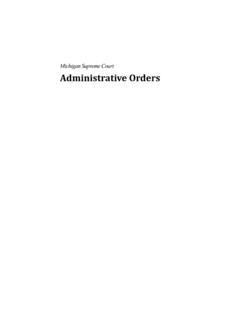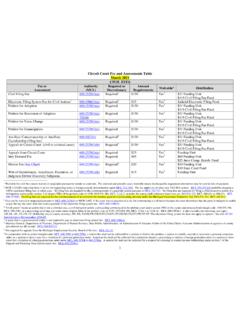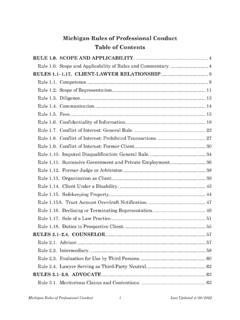Transcription of COA 354866 PEOPLE OF MI V DAWN MARIE DIXON-BEY …
1 If this opinion indicates that it is FOR PUBLICATION, it is subject to revision until final publication in the Michigan Appeals Reports. -1- S T A T E O F M I C H I G A N C O U R T O F A P P E A L S PEOPLE OF THE STATE OF MICHIGAN, Plaintiff-Appellee, FOR PUBLICATION February 1, 2022 9:00 v No. 354866 Jackson Circuit court DAWN MARIE DIXON-BEY , LC No. 15-004596-FC Defendant-Appellant. Before: MARKEY, , and SHAPIRO and RONAYNE KRAUSE, JJ. RONAYNE KRAUSE, J. Defendant, Dawn MARIE DIXON-BEY , appeals as of right her sentence for second-degree murder, MCL This case returns to this court following our decision vacating defendant s first sentence and ordering resentencing.
2 See PEOPLE v DIXON-BEY , 321 Mich App 490; 909 NW2d 458 (2017). We again vacate defendant s sentence and remand for resentencing before a different judge. I. BACKGROUND In defendant s prior appeal, this court set forth the following background facts: Defendant, Dawn MARIE DIXON-BEY , was arrested after admittedly stabbing her boyfriend, Gregory Stack (the victim), to death in their home on February 14, 2015. At first, she claimed that the victim must have been stabbed during an altercation with others before returning to their home. Later, however, defendant admitted that she was the person who stabbed the victim but claimed that she had only done so in self-defense.
3 She was subsequently charged with first-degree murder, MCL , and, after an eight-day jury trial, was found guilty of second-degree murder, MCL [ DIXON-BEY , 321 Mich App at 494-495.] Defendant s sentencing guidelines minimum range was 12 to 20 years, but the trial court imposed a sentence of 35 to 70 years in prison. -2- On appeal, this court affirmed defendant s conviction but vacated her sentence and remanded for resentencing. DIXON-BEY , 321 Mich App at 495. We held that the trial court s upward departure of fifteen years above the top of defendant s guidelines range violated the principle of proportionality, the trial court erred by failing to adequately explain why its sentence was more proportionate than a guidelines sentence, and the trial court erred by concluding that defendant had a noteworthy criminal history on this record.
4 Id. at 523-526. We also held that none of the factors discussed by the trial court provided a reasonable basis for a departure sentence, because those factors were either accounted for by the sentencing guidelines or inconsistent with the scoring of the guidelines. Id. at 526-527. We noted that we were highly skeptical of a trial court s decision to sentence a defendant convicted of second-degree murder as though the murder were premeditated. 1 Id. at 528. We observed that many factors relied upon by the trial court were neither special nor relevant. Id. at 529. At defendant s resentencing hearing, the trial court again acknowledged that defendant s minimum sentencing guidelines were 12 to 20 years.
5 The trial court resentenced her to 30 to 70 years incarceration. II. STANDARDS OF REVIEW AND PRINCIPLES OF LAW A sentence that departs from the applicable guidelines range will be reviewed by an appellate court for reasonableness. PEOPLE v Lockridge, 498 Mich 358, 392; 870 NW2d 502 (2015). [T]he standard of review to be applied by appellate courts reviewing a sentence for reasonableness on appeal is abuse of discretion. PEOPLE v Steanhouse, 500 Mich 453, 471; 902 NW2d 327 (2017). A trial court abuses its sentencing discretion when the sentence imposed by the trial court is disproportionate to the seriousness of the circumstances involving the offense and the offender.
6 Id. at 459-460. A number of factors have been deemed appropriate to consider when determining the proportionality of a departure sentence, including the seriousness of the offense; factors not accounted for by the guidelines, such as the prior relationship between the victim and the defendant, a lack of remorse, or a low potential for rehabilitation; and factors accounted for by the guidelines but given inadequate weight under the circumstances. PEOPLE v Houston, 448 Mich 312, 321-325; 532 NW2d 508 (1995). [D]epartures are appropriate [when] the guidelines do not adequately account for important factors legitimately considered at sentencing.
7 PEOPLE v Milbourn, 435 Mich 630, 657; 461 NW2d 1 (1990). The existence of a departure factor is a factual question reviewed on appeal for clear error. See PEOPLE v Babcock, 469 Mich 247, 264; 666 NW2d 231 (2003). The interpretation of court rules and statutes is a question of law that we review de novo. PEOPLE v Petit, 466 Mich 624, 627; 648 NW2d 193 (2002). When a defendant argues that a trial court denied him or her the right to allocute at sentencing in violation of MCR , this court also reviews de novo the scope and applicability of the common-law right to allocute, also a question of law. PEOPLE v Petty, 469 Mich 108, 113; 665 NW2d 443 (2003).
8 Trial courts must strictly comply with a defendant s right to allocution. PEOPLE v Kammeraad, 307 Mich App 98, 149; 858 NW2d 490 (2014). Claims alleging a violation of constitutional due process are reviewed 1 PEOPLE v Beck, 504 Mich 605; 939 NW2d 213 (2019), cert den sub nom Michigan v Beck, 140 S Ct 1243 (2020), had not yet been decided when this court issued its prior opinion. -3- de novo; however, any underlying factual findings are reviewed for clear error. PEOPLE v Brown, ___ Mich App ___, ___; ___ NW2d ___ (2021) (Docket No. 352001), slip op at p 4. III. PROPORTIONALITY After this court s opinion in defendant s prior appeal, but before the trial court held the resentencing hearing, our Supreme court decided PEOPLE v Beck, 504 Mich 605; 939 NW2d 213 (2019), cert den sub nom Michigan v Beck, 140 S Ct 1243 (2020).
9 Beck held that, unlike uncharged conduct, a trial court is forbidden from using acquitted conduct when crafting a sentence. Id. at 609, 629. Our Supreme court explicitly held that it violates a defendant s right to due process when a judge increases a defendant s sentence because the judge believes that the defendant really committed one or more of the crimes on which the jury acquitted. Id. at 609. As this court has observed, there may be situations under which it is not obvious what conduct should be considered acquitted. Brown, ___ Mich App ___, slip op at pp 5-6. However, this is not one of those situations. The jury acquitted defendant of first-degree murder and convicted her of second-degree murder.
10 It could not be plainer that the jury acquitted defendant of first-degree murder because it found that the element of premeditation was not established. Nevertheless, the trial court , in its own words, g[ave] [defendant] an additional 10 years in prison for a cold blooded, premeditated stabbing of a victim of this community. The trial court s blatant refusal to follow Beck persisted despite both attorneys advising the trial court that Beck prohibited the use of acquitted conduct when crafting a No law or rule obligates courts or individual judges to agree with decisions and opinions from higher courts. Nor is there any law or rule obligating courts or judges to pretend to agree with decisions and opinions from higher courts.











